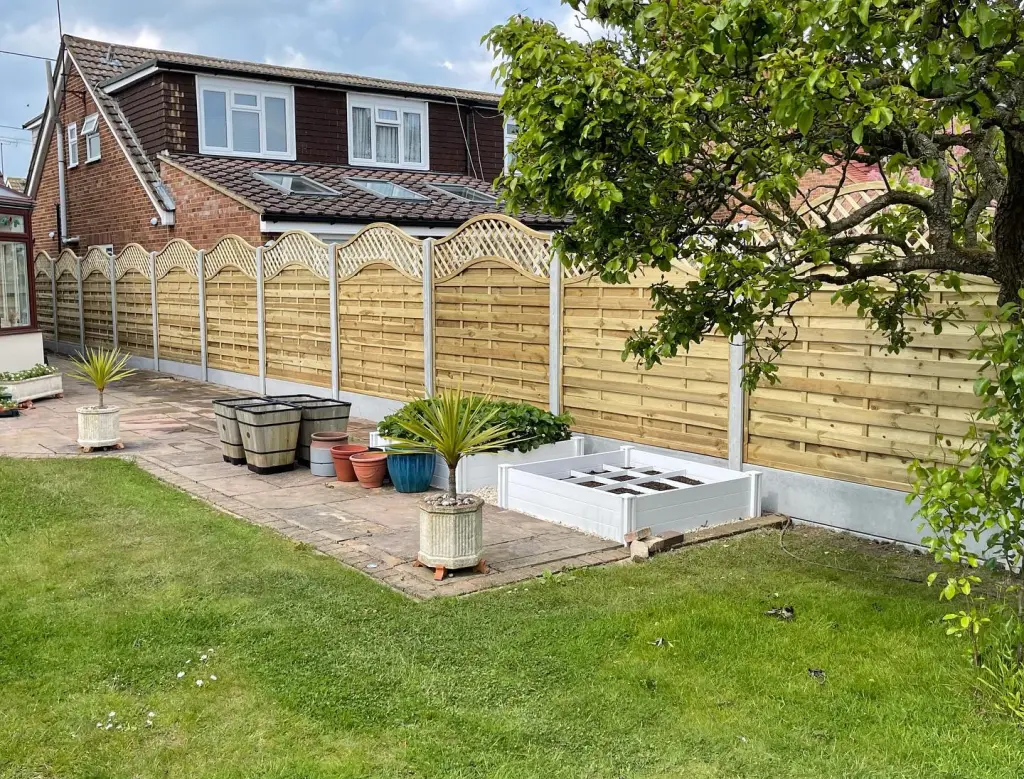Enhancing your garden with a new fence can bring numerous benefits, from increased privacy to improved security and a more defined space. At Fencing Supplies London, we understand the complexities involved in selecting and installing the perfect fence for your needs. Our extensive range of high-quality fencing products and expert guidance ensure that your project will be a success from start to finish. With our deep knowledge of the industry and commitment to customer satisfaction, we aim to make your fencing experience as smooth and enjoyable as possible.
In this detailed guide, we will explore the legalities surrounding garden fencing in the UK, focusing on whether you need your neighbour’s permission to install a fence. We will also cover essential UK garden fence regulations, and important considerations for your project, and offer insights to help you make informed decisions. By the end of this article, you’ll have a clear understanding of the steps involved and how to navigate any potential challenges. Contact us today for more information!
UK Garden Fence Regulations
Understanding the regulations surrounding garden fences is crucial for ensuring that your project complies with local laws and avoids potential disputes. The UK has specific guidelines that govern the height, placement, and materials of fences, and these can vary depending on your location. Here’s a more in-depth look at the key regulations you need to consider:
- Height Restrictions
In the UK, the standard height limit for fences in rear gardens is typically 2 metres. Fences exceeding this height often require planning permission. It’s important to note that different local councils may have varying rules, so it’s wise to check with your local planning authority. For front gardens, the height limit is generally lower to maintain an open and welcoming streetscape. Most councils permit fences up to 1 metre high, though this can be reduced to 0.6 metres if the fence is adjacent to a highway. These restrictions aim to ensure safety and maintain visual appeal.
- Conservation Areas
If your property is located within a conservation area, additional restrictions may apply. Conservation areas are designated to protect the character and appearance of historical or special places. Building a fence in such an area may require planning permission regardless of the height. Your local council will provide specific guidance on what is permissible in conservation areas.
- Listed Buildings
If your property is a listed building, any alterations, including fencing, may need to be approved by your local authority. The goal is to preserve the historical significance and architectural integrity of listed buildings. You will need to apply for listed building consent before proceeding with any changes to your property.
- Party Walls Act
The Party Wall Act 1996 is a significant consideration if your fence is to be built near or on a shared wall or boundary. This act is designed to address disputes between neighbours regarding building work that affects a party wall, party fence wall, or a boundary. If your fence will be built close to or on a party wall, you must notify your neighbour in writing and follow the procedures outlined in the Act. This may involve agreeing on the details of the work and potentially hiring a surveyor.
- Local Council Policies
It’s essential to be aware that local councils may have their own policies and regulations regarding fencing. These policies can cover everything from height limits to design standards. Checking with your local planning authority will help you understand the specific rules that apply to your area and ensure your fencing project complies with local regulations.
Navigating the regulations for garden fencing can seem overwhelming, but understanding these requirements is key to a successful and trouble-free project. By familiarising yourself with these guidelines, you can ensure that your new fence enhances your garden and adheres to all legal standards. With careful planning and attention to detail, you can create a beautiful and compliant fence that meets both your needs and the legal requirements of your area.
Do I need my neighbour’s permission to put a fence up in the UK?
While the general rule is that you do not need your neighbour’s permission to erect a fence, there are several important factors to consider to ensure a smooth and conflict-free process. Here’s a detailed look at the considerations and best practices:
- Boundary Agreements
Many properties have boundary agreements or covenants that specify the responsibilities of each property owner regarding fences and boundaries. These agreements may outline who is responsible for maintaining or erecting fences on boundary lines. Before starting your project, review any relevant property deeds or agreements to ensure you are complying with these requirements.
- Communication with Neighbours
Even if you are not legally required to obtain your neighbour’s permission, it is courteous and advisable to discuss your plans with them. Open communication can help prevent misunderstandings and potential disputes. Informing your neighbours about your plans allows them to voice any concerns or suggestions and can help maintain a positive relationship.
- Party Wall Act Compliance
If your fence will be built on or near a party wall, you must adhere to the requirements of the Party Wall Act. This involves notifying your neighbour in writing and providing details of the proposed work. Your neighbour has the right to object, and if they do, the matter may need to be resolved through a surveyor or legal process. Ensuring compliance with the Act will help avoid legal disputes and potential delays.
- Property Boundaries
Accurate knowledge of your property boundaries is essential. A fence erected on a neighbour’s property can lead to legal issues and disputes. It’s advisable to consult with a land surveyor to confirm the exact boundaries before installing a fence. This will help prevent encroachment and ensure that your fence is positioned correctly within your property.
- Dispute Resolution
If a dispute arises with your neighbour over the fence, addressing it early can prevent escalation. Engage in a calm and respectful discussion to resolve any issues. If necessary, seek mediation or legal advice to address disputes professionally and avoid prolonged conflicts.
While you may not always need formal permission from your neighbour to put up a fence, taking proactive steps to address potential issues can save you from unnecessary conflicts and complications. A well-considered approach not only helps you stay within legal boundaries but also fosters good relations with your neighbours, ultimately leading to a more successful and satisfying fencing experience.
Things to Consider for Your Garden Fencing
When planning your garden fencing project, several factors should guide your decisions to ensure that the result meets your needs and preferences. Here’s a more detailed look at the considerations:
- Purpose of the Fence
Define the primary purpose of your fence. Are you looking for privacy, security, aesthetics, or to contain pets? Understanding the purpose will help you choose the right type of fence and design. For example, a solid panel fence offers high privacy, while a picket fence provides a more decorative and open look.
- Design & Style
Choose a design that complements your home and garden. Consider factors such as the overall aesthetic of your property, the style of your house, and the existing landscape. Popular designs include traditional wooden panels, modern horizontal slats, and decorative metal designs. Ensure the style you choose enhances the visual appeal of your garden while fulfilling its practical functions.
- Maintenance
Different materials require varying levels of maintenance. Wooden fences may need periodic treatment to protect against rot and insects. Metal fences might need rust prevention, while vinyl and composite fences generally require minimal upkeep. Consider how much time and effort you are willing to invest in maintaining your fence when selecting materials. - Installation & Costs
Obtain quotes from multiple suppliers and contractors to understand the total cost of your project. Consider additional expenses such as ground preparation, removal of old fencing, and any necessary permits. Accurate budgeting will help you manage costs and avoid unexpected expenses.
- Local Regulations
Always verify local regulations and guidelines before proceeding with your project. This includes height restrictions, material requirements, and any special considerations for properties in conservation areas or near listed buildings.
In Conclusion: Securing Your Garden with Confidence
Installing a fence is a significant decision that can greatly enhance your garden’s functionality and appearance. By understanding the UK’s garden fence regulations and considering the need for neighbour’s permission, you can navigate the process with confidence. Remember to communicate openly with your neighbours, adhere to local regulations, and carefully plan your project to ensure a successful outcome. With the right preparation and information, you can achieve a beautiful and functional fence that meets your needs and adds value to your home.
At Fencing Supplies London, we are dedicated to making your fencing project as seamless as possible. Our extensive range of high-quality fencing materials, combined with our expert advice, ensures that you will find the perfect solution for your garden. From selecting the ideal style and material to understanding local regulations and ensuring compliance, we are here to support you every step of the way. Trust us to provide not only superior products but also the guidance you need to transform your garden into a secure, stylish space you can enjoy for years to come.
FAQs
Do I need planning permission to put up a fence?
Generally, fences up to 2 metres high in rear gardens do not require planning permission. For front gardens, the height limit is usually 1 metre or 0.6 metres if adjacent to a highway. Check with your local council for specific rules.
Can I put a fence up in my front garden?
Yes, but height restrictions are stricter. Typically, fences in front gardens must not exceed 1 metre in height, or 0.6 metres if adjacent to a highway.
What if my property is in a conservation area?
If your property is in a conservation area, you may need planning permission for any new fence. Consult your local council for specific requirements.
Do I need my neighbour’s consent to build a fence on the boundary line?
You generally do not need explicit consent, but it’s advisable to inform your neighbour and check for any boundary agreements that might apply.
What is the Party Wall Act?
The Party Wall Act requires you to notify your neighbour in writing if your construction work affects a shared wall or boundary. This helps address potential disputes and ensure compliance.
How do I know if my fence is on my property or my neighbour’s?
Consult your property’s title deeds or hire a land surveyor to confirm the exact boundaries before installing a fence.
What materials are best for garden fencing?
The best material depends on your needs and preferences. Options include wood, metal, vinyl, and composite materials, each with its own benefits and maintenance requirements.
How high can a garden fence be without planning permission?
In most cases, a fence up to 2 metres high in a rear garden does not require planning permission. For front gardens, the height limit is typically 1 metre or 0.6 metres if next to a highway.
What should I do if my neighbour objects to my fence?
Address their concerns calmly and try to reach a mutual agreement. If necessary, seek mediation or legal advice to resolve disputes.
Can I remove an old fence myself?
Yes, you can remove an old fence yourself, but ensure you follow safety guidelines and dispose of the materials responsibly.
Ready to transform your garden with a new fence? Contact Fencing Supplies London today to explore our extensive range of high-quality fencing solutions.





